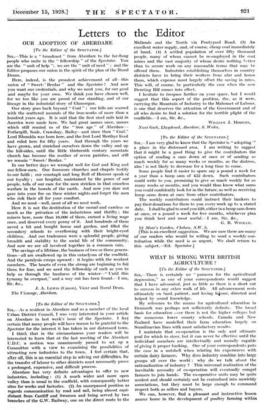Letters to the Editor
OUR ADOPTION OF ABERDARE
[To theEditor of the SPECTATOR.] Sm,—This is a " broadcast " from Aberdare to the far-flung people who unite in the " fellowship " of the Spectator. You are the " unit of help ":, we are the " unit of need " ; and the Editor proposes our union in the spirit of the plan of the Rural Deans.
Here, indeed, is the proudest achievement of all—this union of " Sweet-' Berdar " and the Spectator ! And now you want our credentials, and why we need you, for our good and maybe for your own. We think you have _chosen well, for we too like you are proud of our standing, and of our lineage in the industrial story of Glamorgan.
Our story goes back beyond " Coal " : our hills are scarred with the scattered mounds of the iron-works of more than a hundred years ago. It is said that the first steel rails laid in America were made here. We had great names once, names which still remind us of the " iron age " of Aberdare- Fothergill, Scale, Crawshay, Bailey—and since then " Coal."
Lord Rhondda was born here, and the first Lord Merthyr lived and ruled here for fifty years. And through the years we have grown, and stretched ourselves down the valley and up the hill-sides, until the little thirteenth century mountain church has become the mother of seven parishes, and still we remain " Sweet= Berdar. "
In our better days we wrought well for God and King and our fellow-men. Our fourscore churches and chapels testify to our faith ; our cenotaph and long Roll of Honour speak of our loyalty ; our hospital, maintained by the pence of our people, tells of our care for the men stricken in that ceaseless warfare in the bowels of the earth. And now you dare not gaze into your fire on these winter nights and forget the men who risk' their all for your comfort.
And we need—well, most of all we need work.
Here it is not the destitution of the casual and careless so much as the privation of the industrious and thrifty ; the miners here, more than 10,000 of them, earned a living wage once, and deserved every penny of it. And hundreds of them saved a bit and bought house and garden, and filled the secondary schools to overflowing with their bright-eyed children. And our tradesmen were a splendid people, giving breadth and stability to the social life of the community. And now we are all involved together in a common ruin.
The savings of a lifetime, the business of two or three genera-
tions—all are swallowed up in this cataclysm of the coalfield. And the paralysis creeps upward : it begins with the weakeet members. The hearts of even the strong are beginning to fail them for fear, and we need the fellowship of such as you to help us through the hardness of the winter—" Until this tyranny be overpast," and a way out has been found.—I am, Sir, &e.,








































 Previous page
Previous page